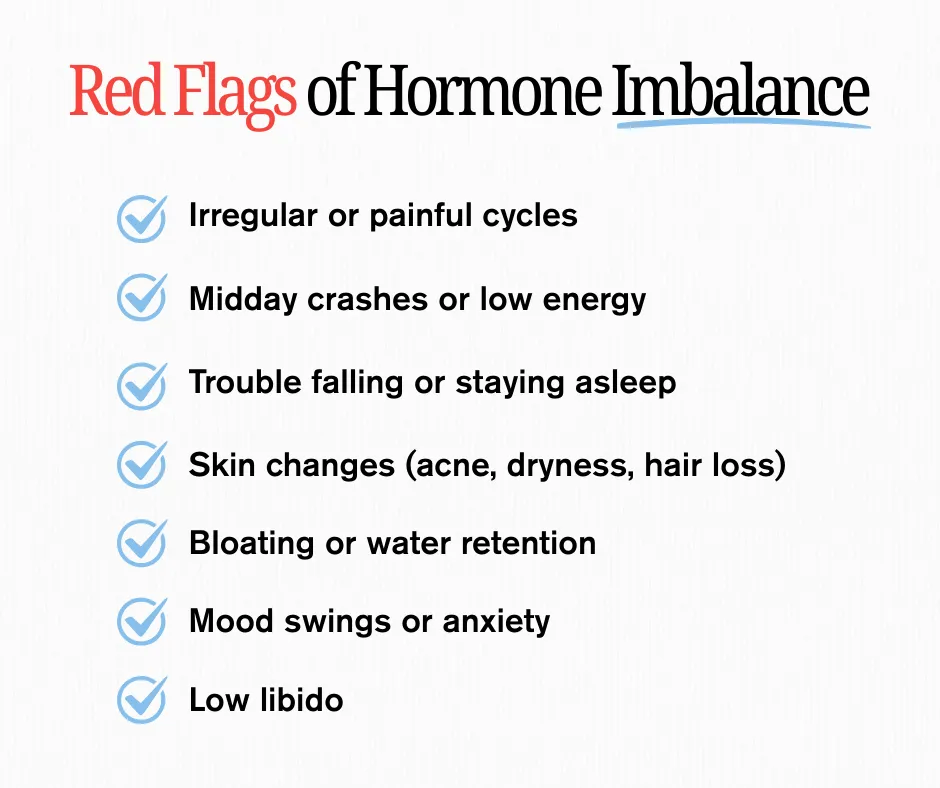
Understanding the Red Flags of Hormone Imbalance
Hormones are powerful chemical messengers that regulate numerous processes in our bodies. From metabolism and mood to reproductive health and sleep patterns, these tiny molecules play a massive role in our overall wellbeing. When our hormones fall out of balance, our bodies often send us warning signals. Recognizing these red flags is the first step toward restoring hormonal harmony and reclaiming your health.
In this post, we'll explore seven key warning signs that may indicate a hormonal imbalance and what you can do about them.
1. Irregular or Painful Cycles
For many women, the menstrual cycle serves as a monthly report card of hormonal health. While some variation is normal, consistently irregular cycles or unusually painful periods may indicate an imbalance in estrogen, progesterone, or other reproductive hormones. Conditions like polycystic ovary syndrome (PCOS), endometriosis, or thyroid dysfunction often manifest through menstrual irregularities.
2. Midday Crashes or Low Energy
Do you find yourself reaching for that third cup of coffee by noon or experiencing a sudden energy slump in the middle of the day? While many factors contribute to energy levels, persistent fatigue and energy crashes can signal issues with cortisol, thyroid hormones, or insulin regulation. These hormones play crucial roles in maintaining steady energy throughout the day.
3. Skin Changes (Acne, Dryness, Hair Loss)
Your skin often reflects what's happening inside your body. Sudden acne breakouts (especially cystic acne along the jawline), unexplained dryness, or noticeable hair loss can all be indicators of hormonal imbalance. Androgens, thyroid hormones, and estrogen all influence skin health and hair growth patterns.
4. Trouble Falling or Staying Asleep
Sleep difficulties are one of the most common complaints among those with hormonal imbalances. Melatonin, cortisol, and reproductive hormones all influence our sleep-wake cycles. When these hormones are out of sync, you may find yourself tossing and turning at night or waking up feeling unrefreshed despite adequate sleep time.
5. Bloating or Water Retention
That uncomfortable feeling of fullness or swelling in your abdomen might be more than just something you ate. Hormones like aldosterone, estrogen, and progesterone help regulate fluid balance in the body. When these hormones are imbalanced, you may experience persistent bloating, puffiness, or water retention that doesn't resolve with dietary changes.
6. Mood Swings or Anxiety
If you find yourself on an emotional rollercoaster, your hormones might be to blame. Estrogen, progesterone, testosterone, cortisol, and thyroid hormones all influence mood regulation. Imbalances in these hormones can contribute to anxiety, irritability, depression, or unexplained mood swings.
7. Low Libido
A healthy sex drive depends on a delicate balance of sex hormones, including estrogen, progesterone, and testosterone. When these hormones fall out of balance, you may notice a decrease in sexual desire or satisfaction. Stress hormones like cortisol can also impact libido by diverting resources away from reproductive functions.
What to Do If You Recognize These Signs
If you're experiencing multiple symptoms from this list, don't ignore them. While occasional symptoms are normal, persistent issues may indicate an underlying hormonal imbalance that requires attention.
The good news is that hormonal imbalances can often be addressed through lifestyle modifications, nutritional support, stress management techniques, and, when necessary, medical interventions. The first step is getting a proper evaluation to understand your unique hormonal profile.